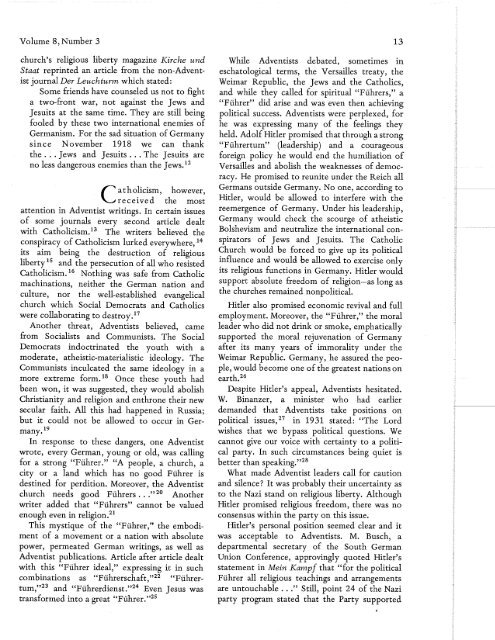Seventh-day Adventist Publications and The Nazi Temptation
Seventh-day Adventist Publications and The Nazi Temptation
Seventh-day Adventist Publications and The Nazi Temptation
Create successful ePaper yourself
Turn your PDF publications into a flip-book with our unique Google optimized e-Paper software.
Volume 8, Number 3church's religious liberty magazine Kirche undStaat reprinted an article from the non-<strong>Adventist</strong>journal Der Leuchturm which stated:Some friends have counseled us not to fighta two-front war, not against the Jews <strong>and</strong>Jesuits at the same time. <strong>The</strong>y are still beingfooled by these two international enemies ofGermanism. For the sad situation of Germanysince November 1918 we can thankthe ... Jews <strong>and</strong> Jesuits ... <strong>The</strong> Jesuits areno less dangerous enemies than the Jews. l2Catholicism,however,received the mostattention in <strong>Adventist</strong> writings. In certain issuesof some journals every second article dealtwith Catholicism.13 <strong>The</strong> writers believed theconspiracy of Catholicism lurked everywhere, 14its aim being the destruction of religiousliberty 15 <strong>and</strong> the persecution of all who resistedCatholicism. 16 Nothing was safe from Catholicmachinations, neither the German nation <strong>and</strong>culture, nor the well-established evangelicalchurch which Social Democrats <strong>and</strong> Catholicswere collaborating to destroy'. 17Another threat, <strong>Adventist</strong>s believed, camefrom Socialists <strong>and</strong> Communists. <strong>The</strong> SocialDemocrats indoctrinated the youth with amoderate, atheistic-materialistic ideology. <strong>The</strong>Communists inculcated the same ideology in amore extreme form. 18 Once these youth hadbeen won, it was suggested, they would abolishChristianity <strong>and</strong> religion <strong>and</strong> enthrone their newsecular faith. All this had happened in Russia;but it could not be allowed to occur in Germany.19In response to these dangers, one <strong>Adventist</strong>wrote, every German, young or old, was callingfor a strong "Fuhrer." "A people, a church, acity or a l<strong>and</strong> which has no good Fuhrer isdestined for perdition. Moreover, the <strong>Adventist</strong>church needs good Fuhrers .. ." 20 Anotherwriter added that "Fuhrers" cannot be valuedenough even in religion. 21This mystique of the "Fuhrer," the embodimentof a movement or a nation with absolutepower, permeated German writings, as well as<strong>Adventist</strong> publications. Article after article dealtwith this "Fuhrer ideal," expressing it in suchcombinations as "Fuhrerschaft,,,22 "Fuhrertum,,,23<strong>and</strong> "Fuhrerdienst."24 Even Jesus wastransformed into a great "Fuhrer.,,25While <strong>Adventist</strong>s debated, sometimes ineschatological terms, the versailles treaty, theWeimar Republic, the Jews <strong>and</strong> the Catholics,<strong>and</strong> while they called for spiritual "Fuhrers," a"Fuhrer" did arise <strong>and</strong> was even then achievingpolitical success. <strong>Adventist</strong>s were perplexed, forhe was expressing many of the feelings theyheld. Adolf Hitler promised that through a strong"Fuhrertum" (leadership) <strong>and</strong> a courageousforeign policy he would end the humiliation ofVersailles <strong>and</strong> abolish the weaknesses of democracy.He promised to reunite under the Reich allGermans outside Germany. No one, according toHitler, would be allowed to interfere with thereemergence of Germany. Under his leadership,Germany would check the scourge of atheisticBolshevism <strong>and</strong> neutralize the international conspiratorsof Jews <strong>and</strong> Jesuits. <strong>The</strong> CatholicChurch would be forced to give up its politicalinfluence <strong>and</strong> would be allowed to exercise onlyits religious functions in Germany. Hitler wouldsupport absolute freedom of religion-as long asthe churches remained nonpolitical.Hitler also promised economic revival <strong>and</strong> fullemployment. Moreover, the "Fuhrer," the moralleader who did not drink or smoke, emphaticallysupported the moral rejuvenation of Germanyafter its many years of immorality under theWeimar Republic. Germany, he assured the people,would become one of the greatest nations onearth. 26Despite Hitler's appeal, <strong>Adventist</strong>s hesitated.W. Binanzer, a mmlster who had earlierdem<strong>and</strong>ed that <strong>Adventist</strong>s take positions onpolitical issues,27 in 1931 stated: "<strong>The</strong> Lordwishes that we bypass political questions. Wecannot give our voice with certainty to a politicalparty. In such circumstances being quiet isbetter than speaking.,,28What made <strong>Adventist</strong> leaders call for caution<strong>and</strong> silence? It was probably their uncertainty asto the <strong>Nazi</strong> st<strong>and</strong> on religious liberty. AlthoughHitler promised religious freedom, there was noconsensus within the party on this issue.Hitler's personal position seemed clear <strong>and</strong> itwas acceptable to <strong>Adventist</strong>s. M. Busch, adepartmental secretary of the South GermanUnion Conference, approvingly quoted Hitler'sstatement in Mein Kampf that "for the politicalFuhrer all religious teachings <strong>and</strong> arrangementsare untouchable .. ." Still, point 24 of the <strong>Nazi</strong>party program stated that the Party supported13


